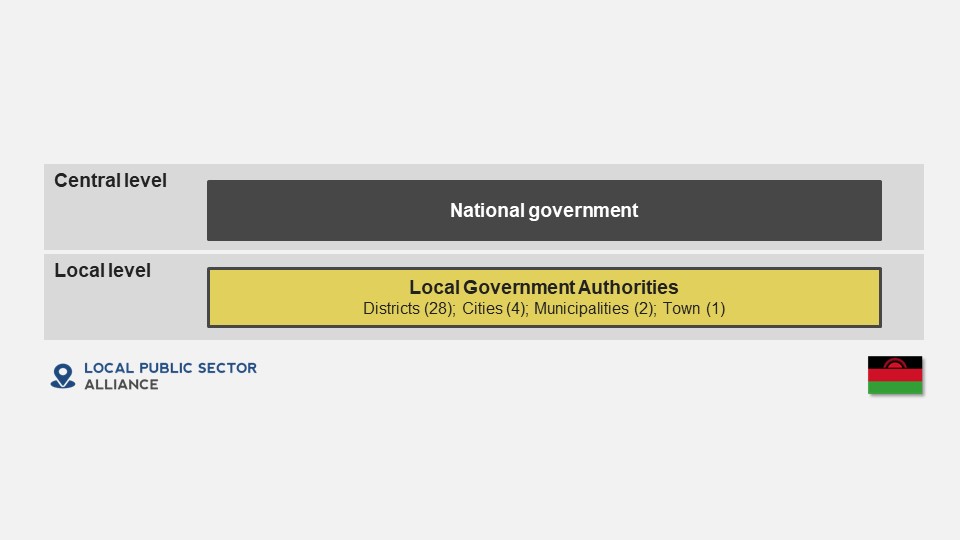
Malawi is a democratic republic in Southeast Africa. The country’s intergovernmental arrangements today originate from the Constitution of 1994, which formally transitioned Malawi from a one-party state to a democratic, multi-party system of government. The Constitution established Local Government Authorities (LGAs) and a subsequent decentralization policy was adopted in 1998 to translate aspirations for local government into reality, supported by the Local Government Act of the same year (amended in 2010). In practice, however, the extent of decentralization has been limited across all key dimensions (political, administrative, and fiscal) with significant powers retained by the central government, resulting in limited de facto autonomy for LGAs, reducing their ability to fulfil their prescribed mandates.
Subnational government structure
Malawi is a unitary state with a single tier of subnational government, formally known as Local Government Authorities (LGAs) but commonly referred to as Councils. Out of the 35 LGAs in total, 28 are district councils which serve rural jurisdictions, while 4 are classified as city councils and 3 are municipal councils, which serve urban areas. Rural and urban LGAs are equivalent to one another, with no subsidiary or supervisory structure, meaning that all local authorities are independent from each other. Previously, Malawi was divided into three regions, which were important deconcentrated units headed be regional administrators; however, these were abolished following the 1998 reforms. While regions remain important geographical units of organization, they no longer have any institutional structure.
Nature of subnational governance institutions
Malawi’s LGAs fall under the category of “hybrid” subnational government institutions. Although LGAs are constitutional, legal and de facto corporate bodies with their own political leadership, chief executive officers, staff and budget, in practice autonomy and power in each of these areas is significantly restricted. As a matter of law, national MPs are voting members of the local council for the constituency they represent, and any by-laws made by the council require approval from the national government. Furthermore, the CEOs and Commissioners of LGAs are centrally appointed, as are most of the staff serving the secretariats, who are subordinate to both the LGA and their parent ministries at the national level. On the fiscal side, even though LGA budgets are approved by the council, they must also be formally approved by the national parliament as they are included as a vote in the national appropriation bill. All of these factors serve to underline that LGAs in Malawi cannot be considered as fully devolved local governments.
Functional assignments
The second schedule of the Local Government Act (1998) defines the functions and responsibilities of LGAs vis-à-vis the central government. While the functional division of responsibilities appears clear in the formal legislation and policy, in practice it is quite different. For example, in the education sector, only primary education is currently financed by LGAs, with other functions that should have been devolved (e.g. ECE and distance learning) being retained at central level. At the same time, there are several functions that are being implemented by LGAs as planned (e.g. primary health, water supply, agricultural extension services) and there are also sub-sectors that were not originally planned to be devolved (e.g. secondary healthcare) but in practice have been. Nevertheless, contrary to the aspirations of the decentralization policy, the planning, budgeting, procurement, and implementation of infrastructure projects across most sectors is still done at central level. Similarly, certain large operational expenditures (e.g., textbooks, drugs) are retained at the central level.
LoGICA Assessment
LoGICA Intergovernmental Profile: Malawi 2023 (Excel)
Selected resources
Malawi Country Profile (World Observatory on Subnational Governance and Investment, OECD/UCLG)
The Local Government System in Malawi (Commonwealth Local Government Forum)
Local government country profile: Malawi (UN Women)
Back to Local Public Sector Alliance Intergovernmental Profiles – Country Page
Last updated: December 29, 2023


